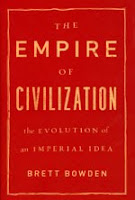Axillary Sciences of History studying the changes of "Civilization" and the inner conflicts of the Rockefeller family.
The Empire of Civilization: The Evolution of an Imperial Idea (BOOK): by Brett Bowden
From the Crusades to the colonial era to the global war on terror, this sweeping volume exposes “civilization” as a stage-managed account of history that legitimizes imperialism, uniformity, and conformity to Western standards, culminating in a liberal-democratic global order. Along the way, Bowden explores the variety of confrontations and conquests—as well as those peoples and places excluded or swept aside—undertaken in the name of civilization. Concluding that the “West and the rest” have more commonalities than differences, this provocative and engaging book ultimately points the way toward an authentic inter-civilizational dialogue that emphasizes cooperation over clashes.
"A timely and significant book that advances our understanding not only of how the discourse of civilization emerged after 1492 and crystallized during the Enlightenment but, above all, how it continues to structure contemporary world politics. Bowden develops a unique multi-disciplinary approach that speaks directly to international relations, international law, and political theory. The book deserves to find its place alongside other key texts written by the likes of Richard Tuck, James Tully, and Antony Anghie."-John M. Hobson, The Eastern Origins of Western Civilization
"This is an extremely erudite book that clearly illustrates Brett Bowden's mastery of a wide variety of philosophical and historical sources. There is a lot of very interesting material here that is of enormous relevance to any contemporary intellectual reader attempting to place the concepts of `civilization' and `civilizations' in their proper historical contexts."-Patrick Thaddeus Jackson,
 The House the Rockefellers Built: A Tale of Money, Taste, and Power in Twentieth-Century
The House the Rockefellers Built: A Tale of Money, Taste, and Power in Twentieth-Century
The Dalzells (George Washington's Mount Vernon) cover five generations of Rockefellers, focusing on the patriarch (called Senior here) and his son (Junior), at least as far as the mansion is concerned, while taking a stab at linking it to issues surrounding American country houses of the Gilded Age. What was different about Kykuit, the Dalzells claim, was the Rockefellers' moral aspirations, their insistence that the house be not only useful and fashionable, but good. Clean prose keeps things moving, but only the most serious Rockefeller devotees will pore over long passages detailing the process of drawing up blueprints, hiring interior decorators and strategizing housekeeping. The Dalzells chronicle every tussle over control of the house's planning between Junior and Senior and, later, between Nelson and his four brothers over Nelson's overflowing art collection. Several fine biographies exist to satisfy readers' curiosity about the Rockefeller family, and it's questionable whether there's nearly as much inherent interest in Kykuit as in




No comments:
Post a Comment